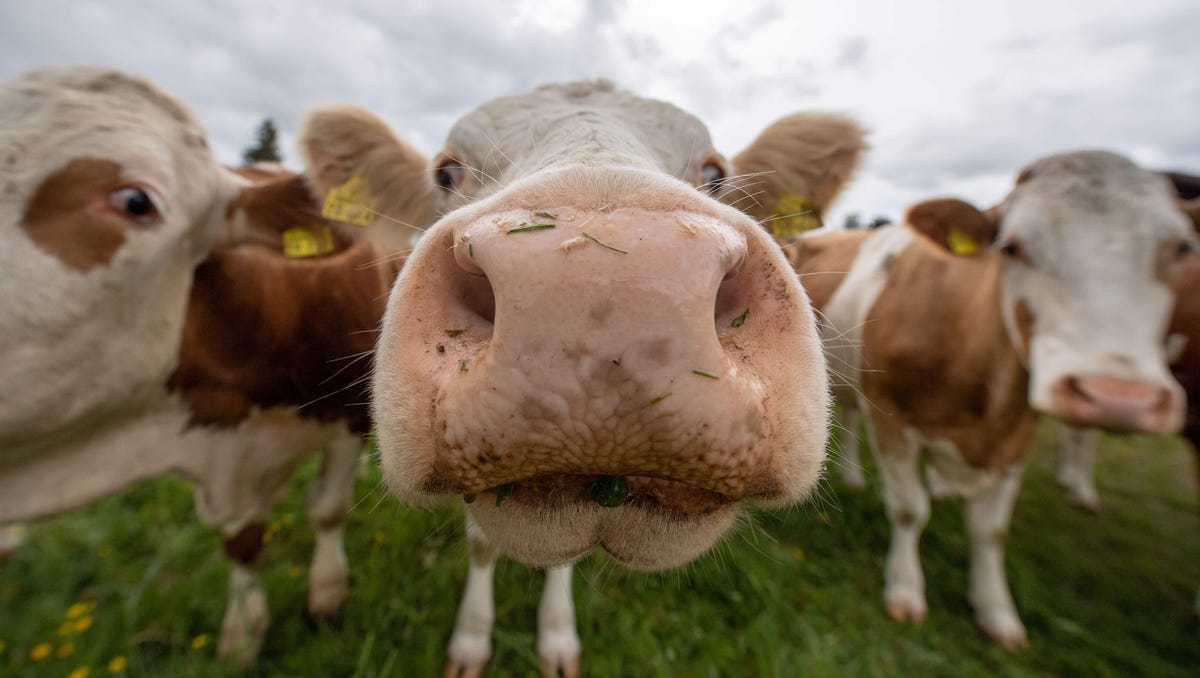Bjorn Lomborg, the author of this piece, is, as can be seen if you followed the link to his wikipedia page posted above, the author of the Skeptical Environmentalist, which is probably what he is best known for. Yes, it's the same person. The book got a lot of press after arguing against global warming (and other environmental issues) being a serious issue and basically saying instead of global warming we should worry about other issues instead. The book's claims were trashed and debunked. It's disappointing that USA Today would write an article from him.
One problem with this article is that it's cherry picking. There is other data suggesting that vegetarian diets are more expensive, but of course that's ignored. The data about the % of carbon emissions saved is incredibly low. I can't link through to his estimate but a reasonable estimate is that you cut your global warming by 10-30% depending on how you measure it. He just ignores all the higher figures and quotes the lowest one he can find.
Another is that the rebound effect is not a moral argument. If data showed that stopping criminals from stealing caused them to get frustrated and carry out more violent attacks instead, that would not be a defence of stealing.
Perhaps Lomborg's basic idea here is to just to take advantage of how easy it is to get attention and make money from going against the consensus, but that is just speculation really. But don't be surprised if he appears on Fox News in a while talking about one of his books.
In a way, this is a kind of progress. 5-10 years ago people didn't even realize meat caused climate change, and now at least almost everyone admits that it does and the debate is just how serious this issue is. At least the issue is in the mainstream a bit more. Someone, somewhere just clicked on this article and just discovered for the first time that meat causes climate change, that vegetarianism therefore reduces climate change, that this is not in dispute and the only argument is about how much of a problem this is.
Yes I have more than one study I posted in my grad school thread which shows that vegetarianism has about half the impact on the environment as
optimum meat consumption. Optimum meat consumption would be something like a flexitarian, or a Mediterranean or Asian person who only eats fish for dinners, or mammal flesh once or twice a week, and not on a daily basis, or who uses meat regularly as a "flavoring" with extremely small portions (sometimes seen in Far East Asian cooking). This is not the SAD where people gorge on multiple meats two to three times in a day.
Veganism does indeed have the smallest carbon footprint, even factoring in things like transport and packaged foods (yes there are studies on this, this is one of the attempts to deride veganism I always hear...that if you eat Tofurky a few times a week, or keep bottles of Vegenaise in your fridge you're still using non-local foods and packaging)...except for specific regions where it is actually easier to raise cattle or goats for milk/cheese, and chickens for pasture eggs. I've often questioned if where I live dairy is more sustainable, because cows do actually roam here, they literally walk around large tracts of land and have for a century, this isn't a new development and they aren't confined and forced to eat buckets of imported grasses in a stall. However, I think this becomes far more relevant in areas where veganism may actually be practically difficult, in developing countries where B12 supplements aren't readily available and food variety is limited, or in areas with rocky steppes where fruit and vegetable ag is too challenging.
Thank you for sharing the history of this person. It makes sense then that he'd write an article like this if he's a conspiracy theorist dead-set about climate change. I mean I know there are vegetarians who "don't want to push their beliefs on others" but that doesn't seem like a reasonable excuse here, since he's writing an article in a major newspaper forcing his beliefs on others about global warming.
He appeared to have a bone to pick with vegans in particular. I picked up on his ire, where he repeatedly said it's veganism not vegetarianism that's the most sustainable, and who the heck is gonna do that? (He's certainly not, from his tone).
I also was annoyed by his weird assumption that people who save money by going veggie would spend that money on activities that burn more fossil fuels. Like...what? I mean, if they go out to dinner, they'll still be vegetarian. If they go to a movie, the movie is already playing for other people in the audience, so it's not like they're using the theater's electricity exclusively for themselves. Does he mean they might take a vacation? And if so, why would he immediately cancel out the possibility that they'd take a train, or buy carbon credits for their flight?

 www.usatoday.com
www.usatoday.com


